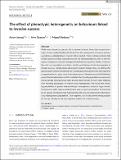The effect of phenotypic heterogeneity on behaviours linked to invasive success
Abstract
While most introduced species fail to become invasive, those that succeed are a major threat to global biodiversity. To improve the management of invasive species, a predictive understanding of invasion risk is needed. There is strong evidence that invasive success is linked to specific traits of the introduced species, and it is well recognised that phenotypic trait heterogeneity is linked to population viability. However, the effects of population-level traits, and the contribution of trait heterogeneity to invasive success, remain poorly addressed in invasion biology. Here, we address this gap by quantifying the contribution of founding population phenotypic heterogeneity to reproductive success (a proxy for invasion success). Namely, we use the Trinidadian guppy (Poecilia reticulata) to test the prediction that founding populations composed of phenotypically heterogeneous males produce larger broods of more viable offspring than founding populations of reduced male heterogeneity. We found that founding populations of greater male phenotypic heterogeneity produced larger broods. Furthermore, whilst male sexual behaviour was an important predictor of brood size for all groups of reduced male heterogeneity, this was not observed for phenotypically heterogeneous populations. Taken together, our results provide strong support for the key role phenotypic heterogeneity plays in the invasion process.
Citation
Jessop , A , Deacon , A & Barbosa , M 2023 , ' The effect of phenotypic heterogeneity on behaviours linked to invasive success ' , Ethology , vol. 129 , no. 4-5 , pp. 187-199 . https://doi.org/10.1111/eth.13356
Publication
Ethology
Status
Peer reviewed
ISSN
0179-1613Type
Journal article
Collections
Items in the St Andrews Research Repository are protected by copyright, with all rights reserved, unless otherwise indicated.

